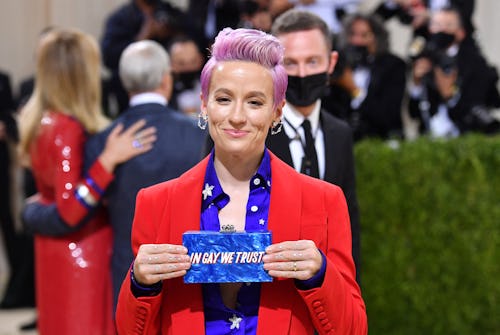
In a move as symbolic as it is demonstrative of the issue's severity, more than 500 women athletes are going straight to the Supreme Court to prevent an anti-abortion dystopia. As part of the Dobbs v. Jackson Women's Health Organization case, the sportswomen joined an amicus brief denouncing anti-abortion laws and meticulously detailing how they can upend the very nature of gender equality.
The staggering number of woman athletes are using their collective influence to make the Supreme Court aware of the devastating effects anti-abortion legislation can have on the totality of women's sports. The WNBA's highest scoring player ever Diana Taurasi, Olympic gold medalist Megan Rapinoe, and vice president of the Women's National Basketball Players Association Layshia Clarendon are a handful of the more than 500 illustrious athletes who joined the amicus brief. They didn't mince words to convey the life-or-death severity of the Supreme Court upholding abortion rights.
The collective, referred to as the amici in the brief, asserts as athletes they are well-versed in pushing their bodies to the limit to play at the highest level, a bodily autonomy which would be stripped away from anti-abortion laws. In a statement, the always outspoken Rapinoe goes as far as to describe those laws as "un-American," and that they "will be met with fierce resistance." Outside of the immorality of taking away a woman's right to choose what to do with her body, the amici points to how anti-abortion laws can tangibly change the trajectory of the careers of women athletes.
"If the State compelled women athletes to carry pregnancies to term and give birth, it could derail women’s athletic careers, academic futures, and economic livelihoods at a large scale," according to the brief.
The amici describe this consequence of anti-abortion laws as potentially deleterious to the women's already difficult struggle for gender equality. Put plainly, they argue that as a result of forcing women athletes to take a pregnancy to term, "many women would have no choice but to sacrifice playing their sport." Pregnancy being a career deterrent is commonplace in women's sports to the point professional runner Phoebe Wright told the New York Times in 2019 "getting pregnant is the kiss of death for a female athlete." Wright partly felt that way due to her former sponsor Nike not paying women athletes' salaries while pregnant, a unsettling practice Nike only chose to change following public outcry caused by the Times article released more than 55 years after the company was founded.
The more you read the amici's brief the fuller the scope becomes of the damage anti-abortion laws can have on the world around us. The brief cites Women's Sports Foundation's findings that 82% of women executives have participated in a sport once in their life outside of elementary school. That trickles down to the all-mighty dollar as the brief notes how research from the Peterson Institute determined “if we were to empower women in our economies, according to McKinsey research, we could add an astounding $12 trillion to the global economy by 2025." Whether it's moral, practical, or financial, the amici demonstrably eviscerates any argument as to why controlling a woman athlete's pregnancy choice is counterproductive at best and a life-altering tragedy at worst.

The Dobbs v. Jackson Women's Health Organization case, scheduled for oral arguments on December 1, centers on Mississippi's Gestational Age Act which bans abortions after a woman's been pregnant for more than 15 weeks unless under severe circumstances. It was signed into law in 2018 but struck down by Federal District Judge Carlton Reeves for the Southern District of Mississippi, a ruling affirmed by the 5th U.S. Circuit Court of Appeals. Abortion opponents are confident in the Supreme Court overturning those decisions after the Court decided to not block Texas's draconian abortion law which would prohibit most abortions after six weeks of pregnancy.
This brief has already received international attention largely because there are more than 500 of the most influential women athletes attached to it. But, the celebrity is merely a megaphone for the message. The significance of this brief is it transparently shows restricting women's rights to abortions affects every facet of American society, from the young girls still forming their idea of who they want to be in the future to the women who have already realized their dreams. Now, it's up to the Supreme Court to prevent a nightmare that could persist for generations.







